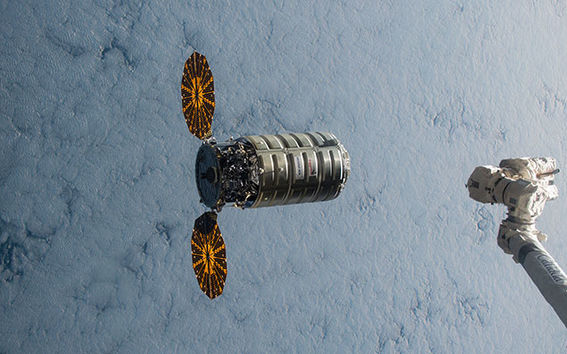Aalto-2 satellite arrived at the International Space Station

The Cygnus cargo spacecraft transporting satellites docked on the station at 1.05 pm. Photo: NASA/ESA
The first leg of the journey for Aalto-2, launched to space from Florida on Tuesday evening Finnish time, is now safely over. The International Space Station robot arm received the Cygnus cargo spacecraft carrying Aalto-2 and dozens of other small satellites at 1.05 pm Finnish time, after which it was installed in the Station’s Unity module in the docking port facing Earth at 3.39 pm on Saturday 22 April.
The robot arm was operated by US astronaut Peggy Whitson from NASA and French astronaut Thomas Pesquet from ESA.
‘I am glad that I could be a part of docking the Cygnus cargo spacecraft to the Space Station and welcome the QB50 satellites. They will be sent into space in May. One of them is Aalto-2 – the first satellite from Finland! I am very pleased that another European Space Agency member state is becoming “a true space nation”’, greeted Pesquet.
‘The Aalto-2 satellite will now spend a few weeks at the Space Station and wait for its turn to be launched. As the plan stands now, the small satellites will be detached to their orbits either on 8 or 15 May’, says Aalto Professor Jaan Praks, who is in charge of Aalto satellite projects.
Aalto-2 and other small satellites will take part in the international QB50 Mission, the aim of which is to produce the first ever comprehensive model of the features of the thermosphere, the layer between the Earth's atmosphere and space. When launch time comes, the astronauts will install the launch adapter into a robot arm, which will allow the satellites to be safely detached to their orbits.
‘The astronauts will film the satellite being detached and that will be the last time we get to see the Aalto-2 satellite before starting to wait for a signal from it’, says Tuomas Tikka, Aalto-2 team Quality Manager, and the current leader of Reaktor Space Lab.
Aalto's other nanosatellite, Aalto-1, will be launched from India with a PSLV rocket in the last week of May.
Further information:
Jaan Praks
Professor, project director
Aalto University
jaan.praks@aalto.fi
tel. +358 (0)50 420 5847
Read also: Aalto-2 satellite launched into space
More information about satellite projects at Aalto (spacecraft.aalto.fi)
More information about the launch of the Aalto-1 satellite (aalto1.fi, in Finnish)
**
QB50 project has received funding from TEKES and the European Union’s Seventh Framework Programme for Research and Technological Development under grant agreement no [284427]. This publication reflects the views only of the authors, and the European Union cannot be held responsible for any use which maybe made of the information contained therein.
Read more news

Aalto University is introducing ORCID’s Researcher Connect service
Aalto University is introducing ORCID's Researcher Connect service, which facilitates information transfer between researchers' ORCID profiles and the university's research information management system, ACRIS.
Nature of Process: Exhibition by the students of the ‘Personal Exploration’ Course
Nature of Process is a multi-material exhibition of 14 Master´s students of Aalto ARTS
Doc+ connects research impact with career direction - join the events!
Doc+ panels have brought together wide audiences in February and continue in March with two events to discuss doctoral careers and their diversity.






